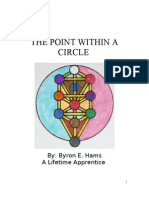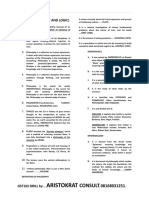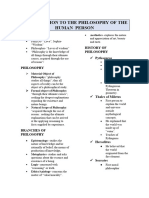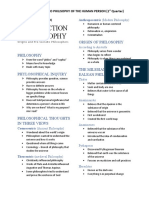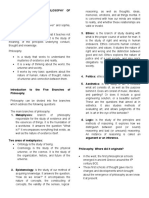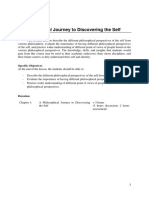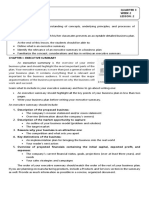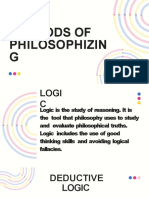0 ratings0% found this document useful (0 votes)
144 viewsLesson 1 (Week 2)
Lesson 1 (Week 2)
Uploaded by
BrenNan Channel1. The document discusses the history and key figures of early Greek philosophy from the 6th century BCE. It covers philosophers like Thales, Anaximander, Pythagoras, Heraclitus, Parmenides, and Socrates.
2. These early philosophers had different views on the fundamental nature of reality. Thales believed it was water, while Anaximander said it was an indefinite substance. Pythagoras focused on mathematical relationships rather than matter.
3. Socrates was interested in human nature and asked philosophical questions about life, purpose, values, and rational reflection to guide behavior.
Copyright:
© All Rights Reserved
Available Formats
Download as DOCX, PDF, TXT or read online from Scribd
Lesson 1 (Week 2)
Lesson 1 (Week 2)
Uploaded by
BrenNan Channel0 ratings0% found this document useful (0 votes)
144 views2 pages1. The document discusses the history and key figures of early Greek philosophy from the 6th century BCE. It covers philosophers like Thales, Anaximander, Pythagoras, Heraclitus, Parmenides, and Socrates.
2. These early philosophers had different views on the fundamental nature of reality. Thales believed it was water, while Anaximander said it was an indefinite substance. Pythagoras focused on mathematical relationships rather than matter.
3. Socrates was interested in human nature and asked philosophical questions about life, purpose, values, and rational reflection to guide behavior.
Original Title
lesson 1 ( week 2 )
Copyright
© © All Rights Reserved
Available Formats
DOCX, PDF, TXT or read online from Scribd
Share this document
Did you find this document useful?
Is this content inappropriate?
1. The document discusses the history and key figures of early Greek philosophy from the 6th century BCE. It covers philosophers like Thales, Anaximander, Pythagoras, Heraclitus, Parmenides, and Socrates.
2. These early philosophers had different views on the fundamental nature of reality. Thales believed it was water, while Anaximander said it was an indefinite substance. Pythagoras focused on mathematical relationships rather than matter.
3. Socrates was interested in human nature and asked philosophical questions about life, purpose, values, and rational reflection to guide behavior.
Copyright:
© All Rights Reserved
Available Formats
Download as DOCX, PDF, TXT or read online from Scribd
Download as docx, pdf, or txt
0 ratings0% found this document useful (0 votes)
144 views2 pagesLesson 1 (Week 2)
Lesson 1 (Week 2)
Uploaded by
BrenNan Channel1. The document discusses the history and key figures of early Greek philosophy from the 6th century BCE. It covers philosophers like Thales, Anaximander, Pythagoras, Heraclitus, Parmenides, and Socrates.
2. These early philosophers had different views on the fundamental nature of reality. Thales believed it was water, while Anaximander said it was an indefinite substance. Pythagoras focused on mathematical relationships rather than matter.
3. Socrates was interested in human nature and asked philosophical questions about life, purpose, values, and rational reflection to guide behavior.
Copyright:
© All Rights Reserved
Available Formats
Download as DOCX, PDF, TXT or read online from Scribd
Download as docx, pdf, or txt
You are on page 1of 2
GRADE LEVEL: SHS 12 WEEK: 2
SUBJECT: Introduction to the Philosophy of the Human Person LESSON: 1
TOPIC: DOING PHILOSOPHY
--------------------------------------------------------------------------------------------------------------------------------------------------
OBJECTIVES: He believed that water, through some natural
1. Distinguish a holistic perspective from a partial process, gave rise to everything else in the
point of view world.
2. Recognize human activities that emanated from Axial Age
deliberate reflection In the sixth century BCE, an originality and
3. Realize the value of doing philosophy in fertility of thought and philosophy occurred all
obtaining a broad perspective on life over the world and at almost the same time. In
LESSON PROPER: Ionia, you had the Greek philosophers Thales
LESSON 1: WHAT IS PHILOSOPHY? and Anaximander. In Israel, you had the Hebrew
" Philos – “Love”, Sophia –”Wisdom” prophets Jeremiah, Ezekiel, and Daniel. In china,
Philosophy is the knowledge of all things there was Confucius and Lao Tzu, the founder of
through their ultimate causes, acquired through Taoism. In India, there was the Buddha, the
the use of reason. founder of Buddhism as well as Mahavira, the
Philosophy is a way of thinking about certain founder of Jainism. In Persia, there was
subjects such as ethics, thought, existence, Zoroaster.
time, meaning and value. That 'way of thinking' Anaximander
involves 4 Rs: responsiveness, reflection, reason c. 611 -547 BCE
and re-evaluation. The aim is to deepen Sixth century Ionian
understanding. The hope is that by doing Rejected Thales’ view that water was the
philosophy we learn to think better, to act more original and basic substance.
wisely, and thereby help to improve the quality Instead he suggested an indefinite substance,
of all our lives. which he simply called Boundless, the source of
The Meaning of Philosophy and Philosophy of the all things.
Human Person The boundless, he believed, was the
Philosophy applied to human experience or Anaximenes
everyday life denotes the use of philosophy as Sixth century BCE Ionian philosopher.
an intellectual activity. Also known as Basic primary substance was air.
philosophy in life, this concept is important Rejected the commonly beliefs that rainbows
because it serves as the guiding principle on were the goddess Iris.
how one ought to live life. He insisted that rainbows were caused by the
Meaning and Process of Doing Philosophy rays of the sun
In the process of doing philosophy, it is critical Pythagoras
to have a holistic point of view—the perception c. 580 – 507 BCE lived in
of looking at all aspects of a situation first Southern Italy
before making a conclusion. Some other skills He believed and taught
involved in doing philosophy are critical, logical, that the underlying reality
and analytical thinking, observation, and of nature was not in any
communicative skills. basic or particular
Greek Philosophers and their Contributions: substance.
HOMER Basic nature of things was
Greek Poet who lived in the 8 century BCE in mathematical
(Before Common Era) about 2800 years ago. relationships which emphasized FORM.
Homer reveals through his poem that ideas and “Music of the Spheres” Unlike Ionians which
actions have consequences for human beings. emphasized MATTER and SENSE EXPERIENCE,
A person of excellence, according to Homer, is Pythagoreans focuses on MATHEMATICAL
one who realizes the total human potential, LOGIC
who is both a speaker of words and doer of Parmenides
deeds. c. 515-450 BCE from Greek city
His two great poems, the Iliad and Odyssey of Elea in Southern Italy
which showed the deepest longings, fear, Applied Logic of Mathematics
thoughts, feelings, hopes and conflict of human. in his philosophical thinking
THALES Believed in “cosmos” which are external,
c.624 – 546 BCE from Miletus, a city in Ionia. eternal, unchanging and material universe
Ionian philosophy began with him Ultimate reality known through reason alone,
6th century philosopher belongs to what Karl which started the Western Metaphysics
Jaspers calls the “Axial Age” Everything in the universe is CONSTANT
He concerned himself mainly with nature, not Everything is in a state of being
human nature especially the basic element of
nature was WATER. Heraclitus
c. 544-483 BCE was a pre-Socratic Philosopher
He was a contemporary of Parmenides
Everything in the universe as fire, which as a
basic material in the world and the
fundamentals cause of all the change and
motion in the world
Everything in the universe is always in change
Everything is in a state of becoming
Everything is in a state of FLUX-State of flux is
establishment of a new direction of actions- 2. _____________________
Democritus _______________________
460-370 BCE from Greece _______________________
Concerned with the world of matter which _______________________
made of atom that were eternal, indivisible and _______________________
invisible to the human eye
Believed knowledge derived through the sense ASSESSMENT:
Socrates RECALL: Answer the following questions.
Write your answer in 1 whole sheet of pad paper.
c. 469-399 BCE lived in Athens, Greece
Great philosopher in the history of Philosophy
1. Who are Parmenides, Pythagoras and Plato?
Focuses at human nature and human person 2. What is just state according to Plato?
He asked questions like: What is the meaning of 3. How did Aristotle differ from Plato?
life? What is the purpose of life? How should 4. What was Plato’s theory on coming up with a
we regulate our behavior? What values should just state? On coming up with the best leader
govern our lives? 5. What are the two great poems of Homer?
Believed that individuals should regulate their
lives based on rational reflection ASSIGNMENT: SKETCH A PHILOSOPHER
True education meant values that are shaped INSTRUCTION: In a long size bond paper,
through the critical use of reason draw/illustrate 1 philosopher that you think contribute
His goal was the perfect human existence: the a lot in the world of Philosophy. Justify/ explain why
man of excellence (Dialectics)-Dialectics is a you chose that Philosopher. Put your explanation under
method of inquiry through dialogue- your illustration/drawing. (30 pts.)
Plato
c. 429 – 347 BCE a wealthy man transformed
REFERENCES:
when he encountered Socrates.
For him “Philosophy was a passionate way of Introduction to the Philosophy of the Human
life” Person book. (Sunil H. Stephens)
Plato’s Philosophy is “Theory of Ideas” Internet (PDF Files)
True wisdom is gained through the knowledge
of Ideas, not perceived through senses.
Materials:
ACTIVITY 1:
INSTRUCTION: What can you say about the pictures Notebook
below? Have you been in this kind of situation? What Ball pen
are the things that you considered in making choices?
Pencil
Write your answer in the space provided.
Bond Paper
1.______________________
_______________________
_______________________
_______________________
_______________________
_______________________
You might also like
- Philo Module 2 - History of Philosophy PDFDocument5 pagesPhilo Module 2 - History of Philosophy PDFErwin ResurreccionNo ratings yet
- The Point Within A CircleDocument18 pagesThe Point Within A CircleByron E. Hams0% (1)
- Virtual Long Bone Dissection-2Document2 pagesVirtual Long Bone Dissection-2api-435871995No ratings yet
- Employment Application Form: Accenture Solutions Private LimitedDocument8 pagesEmployment Application Form: Accenture Solutions Private LimiteddivyaNo ratings yet
- 1877 The Three Worlds PDFDocument197 pages1877 The Three Worlds PDFjesusishorusNo ratings yet
- Grade Level: 12 Subject: Physical Education and Health Topic: Recreational Activity Quarter: 3 WEEK: 1&2 Lesson: 1 Content Standards: Performance StandardsDocument17 pagesGrade Level: 12 Subject: Physical Education and Health Topic: Recreational Activity Quarter: 3 WEEK: 1&2 Lesson: 1 Content Standards: Performance StandardsBrenNan ChannelNo ratings yet
- Personal Development (2ndsem)Document43 pagesPersonal Development (2ndsem)BrenNan ChannelNo ratings yet
- Grade Level: 12 Quarter: 3 Subject: Entrepreneurship Week: 1 Topic: Introduction of Entrepreneurship Lesson: 1Document4 pagesGrade Level: 12 Quarter: 3 Subject: Entrepreneurship Week: 1 Topic: Introduction of Entrepreneurship Lesson: 1BrenNan ChannelNo ratings yet
- Mock Interview RubricDocument2 pagesMock Interview RubricBrenNan ChannelNo ratings yet
- GST102 Philosophy Logic of ScienceDocument5 pagesGST102 Philosophy Logic of ScienceOnwe chinonso EkunyiNo ratings yet
- Philosophy Notes PaprintDocument14 pagesPhilosophy Notes Paprintmaurilloapril7No ratings yet
- Philosophy ReviewerDocument5 pagesPhilosophy ReviewerMary Claire SodeNo ratings yet
- History of Western Philosophy - 2020Document19 pagesHistory of Western Philosophy - 2020Nelson James BernalNo ratings yet
- TimelineDocument1 pageTimelineVergie Fernandez ParungaoNo ratings yet
- Philosophy reviewerDocument9 pagesPhilosophy reviewerAileen Joy SantolajaNo ratings yet
- Philosophy NotesDocument6 pagesPhilosophy NotesSheena CansonNo ratings yet
- Understanding The SelfDocument3 pagesUnderstanding The SelfpauliNo ratings yet
- Introduction To The Philosophy of Human PersonDocument3 pagesIntroduction To The Philosophy of Human PersonHaine Otomiya100% (1)
- Introduction To The Philosophy of The Human PersonDocument3 pagesIntroduction To The Philosophy of The Human PersonRaine EscalicasNo ratings yet
- Reviewer in PhilosophyDocument13 pagesReviewer in PhilosophyHANZEL JUDE PIMENTELNo ratings yet
- (Template) Philosophy of The Self.Document6 pages(Template) Philosophy of The Self.Jefferson Madridano LotivioNo ratings yet
- CPHILODocument13 pagesCPHILOchris santianaNo ratings yet
- A Brief History of Ether A Fundamental CDocument39 pagesA Brief History of Ether A Fundamental CyahyaNo ratings yet
- Ancientphilo SolisDocument17 pagesAncientphilo SolisJerick Mercado RosalNo ratings yet
- Symbolisme EtherDocument38 pagesSymbolisme EtherRobert Fripp100% (1)
- What Is PhilosophyDocument7 pagesWhat Is PhilosophyAljean Nathalia OteroNo ratings yet
- Ethics MidtermDocument4 pagesEthics Midtermantenorsarahmichelle7No ratings yet
- Introduction To The Philosophy of Human PersonDocument3 pagesIntroduction To The Philosophy of Human PersonMonard NojanesNo ratings yet
- Mahidlawon, Jane O. Bscpe 1-7 February 8, 2020Document4 pagesMahidlawon, Jane O. Bscpe 1-7 February 8, 2020Jane MahidlawonNo ratings yet
- UTS - RevDocument11 pagesUTS - Revs.jmmbautistaNo ratings yet
- Love Wisdom Metaphysical Character:: Attention of The CrowdDocument5 pagesLove Wisdom Metaphysical Character:: Attention of The Crowdela kikayNo ratings yet
- Philosophy ReviewerDocument8 pagesPhilosophy Reviewerjmfabian123No ratings yet
- PHILOSOPHY - Reviewer KoDocument7 pagesPHILOSOPHY - Reviewer KoManuelMarasiganMismanosNo ratings yet
- Ethics Finals ReviewerDocument26 pagesEthics Finals Reviewerkenniaustria315No ratings yet
- Philosophy NotesDocument10 pagesPhilosophy NotesClaire TipayNo ratings yet
- UTS Reviewer 1Document7 pagesUTS Reviewer 1Ais WallensteinNo ratings yet
- Lesson 1: What Is Philosophy?Document14 pagesLesson 1: What Is Philosophy?jijiNo ratings yet
- Beginners Guide To Logic: Submitted by Rexiel Val M. Adolfo Ryan Christian Anora Lanz Dela Cruz Keith ReveloDocument52 pagesBeginners Guide To Logic: Submitted by Rexiel Val M. Adolfo Ryan Christian Anora Lanz Dela Cruz Keith ReveloRez AdolfoNo ratings yet
- Philosophy Notes - Week 2Document4 pagesPhilosophy Notes - Week 2Ian IglesiaNo ratings yet
- Introduction To The Philosophy of The Human PersonDocument6 pagesIntroduction To The Philosophy of The Human PersonArianne LaureNo ratings yet
- PhilMan-Reviewer2 0Document4 pagesPhilMan-Reviewer2 0Klarisi VidalNo ratings yet
- Lesson 1: The Nature of PhilosophyDocument4 pagesLesson 1: The Nature of PhilosophyEunice C. LoyolaNo ratings yet
- Philosophy ReviewerDocument2 pagesPhilosophy ReviewerZhynna SanchezNo ratings yet
- Uts PhilosophersDocument16 pagesUts PhilosophersWinly Blanco TortorNo ratings yet
- Philosophy: Historical Period School of Thought Main Features, Beliefs Notable PhilosophersDocument8 pagesPhilosophy: Historical Period School of Thought Main Features, Beliefs Notable PhilosophersJhiamae PiqueroNo ratings yet
- Introduction To Philosophy - NotesDocument4 pagesIntroduction To Philosophy - NotesSAMANTHA ANN GUINTONo ratings yet
- Lesson 1Document4 pagesLesson 1Carlos TuazonNo ratings yet
- Notes in PhilosophyDocument9 pagesNotes in Philosophyteptepqw123No ratings yet
- Uts ReviewerDocument6 pagesUts Reviewerhotdog killingNo ratings yet
- And Hestoid For Filling People's Heads With Fanatic TalesDocument2 pagesAnd Hestoid For Filling People's Heads With Fanatic TalesCrestNo ratings yet
- Ethics Finals Notes Chapter 1 15Document28 pagesEthics Finals Notes Chapter 1 15Carlvin BautistaNo ratings yet
- Philo Part 2Document4 pagesPhilo Part 2annekirstenbonifacioNo ratings yet
- Introduction To The Philosophy of The Human Person: Lesson No. 1 Doing Philosophy Learning ObjectivesDocument5 pagesIntroduction To The Philosophy of The Human Person: Lesson No. 1 Doing Philosophy Learning ObjectivesVEDIXANo ratings yet
- Psych 101 Prelim Lesson 2 - What Philosophy Says About The SelfDocument5 pagesPsych 101 Prelim Lesson 2 - What Philosophy Says About The Self12B-Bracero Meg R.No ratings yet
- GEC1 Chapter 1 To 5Document87 pagesGEC1 Chapter 1 To 5Shania Lane GarciaNo ratings yet
- Chapter 1 UtsDocument16 pagesChapter 1 UtsRapidoo PhNo ratings yet
- Philosophy and Logic: Atty. Reyaine A. MendozaDocument19 pagesPhilosophy and Logic: Atty. Reyaine A. MendozayenNo ratings yet
- Reviewer in Philosophy DannifyingDocument5 pagesReviewer in Philosophy DannifyingtristanjayapilanNo ratings yet
- Week 1 Introduction and Branches of PhilosophyDocument22 pagesWeek 1 Introduction and Branches of PhilosophyjacaranasNo ratings yet
- UTS - Prelims NotesDocument8 pagesUTS - Prelims NotesDhon Aldrin CastroNo ratings yet
- Ethics ReviewerDocument1 pageEthics ReviewerzyvareousNo ratings yet
- Beginners Guide To Logic: Submitted by Rexiel Val M. Adolfo Ryan Christian Anora Lanz Dela Cruz Keith ReveloDocument52 pagesBeginners Guide To Logic: Submitted by Rexiel Val M. Adolfo Ryan Christian Anora Lanz Dela Cruz Keith ReveloRez AdolfoNo ratings yet
- On The Connexion Between Indian and Greek Philosophy - Richard Garbe (1894)Document19 pagesOn The Connexion Between Indian and Greek Philosophy - Richard Garbe (1894)Đoàn DuyNo ratings yet
- An Archetype Is An Image That All Humans Use To Represent The Essential Qualities of SomeDocument6 pagesAn Archetype Is An Image That All Humans Use To Represent The Essential Qualities of SomeZarina AulabayevaNo ratings yet
- Philosophy-Module 1Document6 pagesPhilosophy-Module 1gericj7dsNo ratings yet
- INTRODUCTION TO THE PHILOSOPHY OF HUMAN PERSON ReviewerDocument4 pagesINTRODUCTION TO THE PHILOSOPHY OF HUMAN PERSON ReviewerDeseree De RamosNo ratings yet
- How To Form A Cooperative JepDocument71 pagesHow To Form A Cooperative JepBrenNan ChannelNo ratings yet
- Republic Act CooperativeDocument72 pagesRepublic Act CooperativeBrenNan ChannelNo ratings yet
- Session Topic1 - Intro To Research Methods and Statistcs - 1sttri - AY2021-2022Document13 pagesSession Topic1 - Intro To Research Methods and Statistcs - 1sttri - AY2021-2022BrenNan ChannelNo ratings yet
- Lyceum of The Philippines-Cavite: Gsihm002 - Total Quality ManagementDocument5 pagesLyceum of The Philippines-Cavite: Gsihm002 - Total Quality ManagementBrenNan ChannelNo ratings yet
- COHREP Youth Con Parallel Activity TemplateDocument3 pagesCOHREP Youth Con Parallel Activity TemplateBrenNan ChannelNo ratings yet
- Session Topic3 - Chap 1 Introduction - 1sttri2020-21Document21 pagesSession Topic3 - Chap 1 Introduction - 1sttri2020-21BrenNan ChannelNo ratings yet
- Chapter Ii: Management and OrganizationDocument6 pagesChapter Ii: Management and OrganizationBrenNan ChannelNo ratings yet
- Philo Lesson1Document19 pagesPhilo Lesson1BrenNan ChannelNo ratings yet
- Lesson 2: What Is Philosophy ?Document25 pagesLesson 2: What Is Philosophy ?BrenNan ChannelNo ratings yet
- Entrep Q3 Week 2Document4 pagesEntrep Q3 Week 2BrenNan ChannelNo ratings yet
- Lesson 4: Methods of Philosophizin GDocument18 pagesLesson 4: Methods of Philosophizin GBrenNan ChannelNo ratings yet
- The Human Person As An Embodied Spiritual Being: LessonDocument17 pagesThe Human Person As An Embodied Spiritual Being: LessonBrenNan ChannelNo ratings yet
- Bread Making: Ddiscussion For The Performance Task in Bread and Pastry Production NC-IIDocument43 pagesBread Making: Ddiscussion For The Performance Task in Bread and Pastry Production NC-IIBrenNan ChannelNo ratings yet
- Learning Outcome 4: Maintaining Occupational Safety and Health AwarenessDocument4 pagesLearning Outcome 4: Maintaining Occupational Safety and Health AwarenessBrenNan ChannelNo ratings yet
- Mock Job Interview: Interpersonal SkillsDocument2 pagesMock Job Interview: Interpersonal SkillsBrenNan Channel100% (1)
- 1 Understanding Work ImmersionDocument10 pages1 Understanding Work ImmersionBrenNan ChannelNo ratings yet
- 1 Understanding Work ImmersionDocument46 pages1 Understanding Work ImmersionBrenNan Channel100% (1)
- PT Bread MakingDocument8 pagesPT Bread MakingBrenNan ChannelNo ratings yet
- 2 Appreciating The Importance of CredentialsDocument15 pages2 Appreciating The Importance of CredentialsBrenNan ChannelNo ratings yet
- IN Work Immersion: Grade 12 Senior High School Immersion ManualDocument10 pagesIN Work Immersion: Grade 12 Senior High School Immersion ManualBrenNan ChannelNo ratings yet
- #1 PorsemDocument37 pages#1 PorsemBrenNan ChannelNo ratings yet
- Lesson 4: Practice Occupational Safety and Health ProceduresDocument6 pagesLesson 4: Practice Occupational Safety and Health ProceduresBrenNan Channel100% (2)
- Top 5 Tourist Spots in MindanaoDocument4 pagesTop 5 Tourist Spots in MindanaoVivian Albert SantosNo ratings yet
- Ermak en PDFDocument5 pagesErmak en PDFMimi MimiNo ratings yet
- MBE Question BankDocument4 pagesMBE Question BankMonisha ReddyNo ratings yet
- Law Flow ChartsDocument7 pagesLaw Flow ChartsmauliksanghaviNo ratings yet
- Research TitleDocument25 pagesResearch TitleMonica MinaNo ratings yet
- Resume CanvaDocument1 pageResume Canvaapi-442270309No ratings yet
- (W.Grudem Systematic Theology An Introduction PDFDocument1,123 pages(W.Grudem Systematic Theology An Introduction PDFNagy DávidNo ratings yet
- Critical Situational Analysis and Business JustificationDocument17 pagesCritical Situational Analysis and Business JustificationAmolo OukoNo ratings yet
- ManageEngine DDI Central User Guide (1) - 1-232Document232 pagesManageEngine DDI Central User Guide (1) - 1-232akshra7gjNo ratings yet
- Account Statement From 1 Mar 2019 To 31 Mar 2019: TXN Date Value Date Description Ref No./Cheque No. Debit Credit BalanceDocument2 pagesAccount Statement From 1 Mar 2019 To 31 Mar 2019: TXN Date Value Date Description Ref No./Cheque No. Debit Credit BalanceSaurabh SinghNo ratings yet
- Evaluation of The Role of Encryption Techniques in E CommerceDocument10 pagesEvaluation of The Role of Encryption Techniques in E CommerceLame Segokgo100% (2)
- Case Analysis ABS-CBNDocument10 pagesCase Analysis ABS-CBNJullie ValdezNo ratings yet
- Mt233B: Kinematics: Learning ModuleDocument40 pagesMt233B: Kinematics: Learning ModuleJohn Nathaniel Batulan SenayoNo ratings yet
- Santa Barbara County Radio ReadyDocument1 pageSanta Barbara County Radio Readygiana_magnoliNo ratings yet
- Guide To Nutrilite Liv 360 Order ProcessingDocument21 pagesGuide To Nutrilite Liv 360 Order ProcessingRaghu NayakNo ratings yet
- Untitled Form - Google FormsDocument6 pagesUntitled Form - Google Formsmayankagrawal549No ratings yet
- Mystery Tunnels of South AmericaDocument3 pagesMystery Tunnels of South AmericaCarlos Diez De MedinaNo ratings yet
- Manual Do Usuário Do Laz Stats PDFDocument476 pagesManual Do Usuário Do Laz Stats PDFLuiz PereiraNo ratings yet
- 2024 PHSP - List of Service ProvidersDocument20 pages2024 PHSP - List of Service ProvidersKalyango IsããcNo ratings yet
- 7 Day Research Methodology Workshop ANUDocument2 pages7 Day Research Methodology Workshop ANUVinod KumarNo ratings yet
- Essay 2013 6thDocument3 pagesEssay 2013 6thapi-233439498No ratings yet
- Listado de Productos Revlon: Item Descripcion Fotos CantDocument3 pagesListado de Productos Revlon: Item Descripcion Fotos CantAlejandro Fernandez L.No ratings yet
- Controls For Differentiated Strategies - TunishaDocument21 pagesControls For Differentiated Strategies - TunishaTunisha JethwaniNo ratings yet
- 1203 Weight Transmitter Reference Manual: For Use With Software Versions 1.0 and AboveDocument56 pages1203 Weight Transmitter Reference Manual: For Use With Software Versions 1.0 and Abovesongs SomervilleNo ratings yet
- Breast SurgeryDocument6 pagesBreast SurgeryDeedee Rocha100% (1)
- Lesson Plan Ten MathDocument2 pagesLesson Plan Ten Mathapi-300889911No ratings yet

